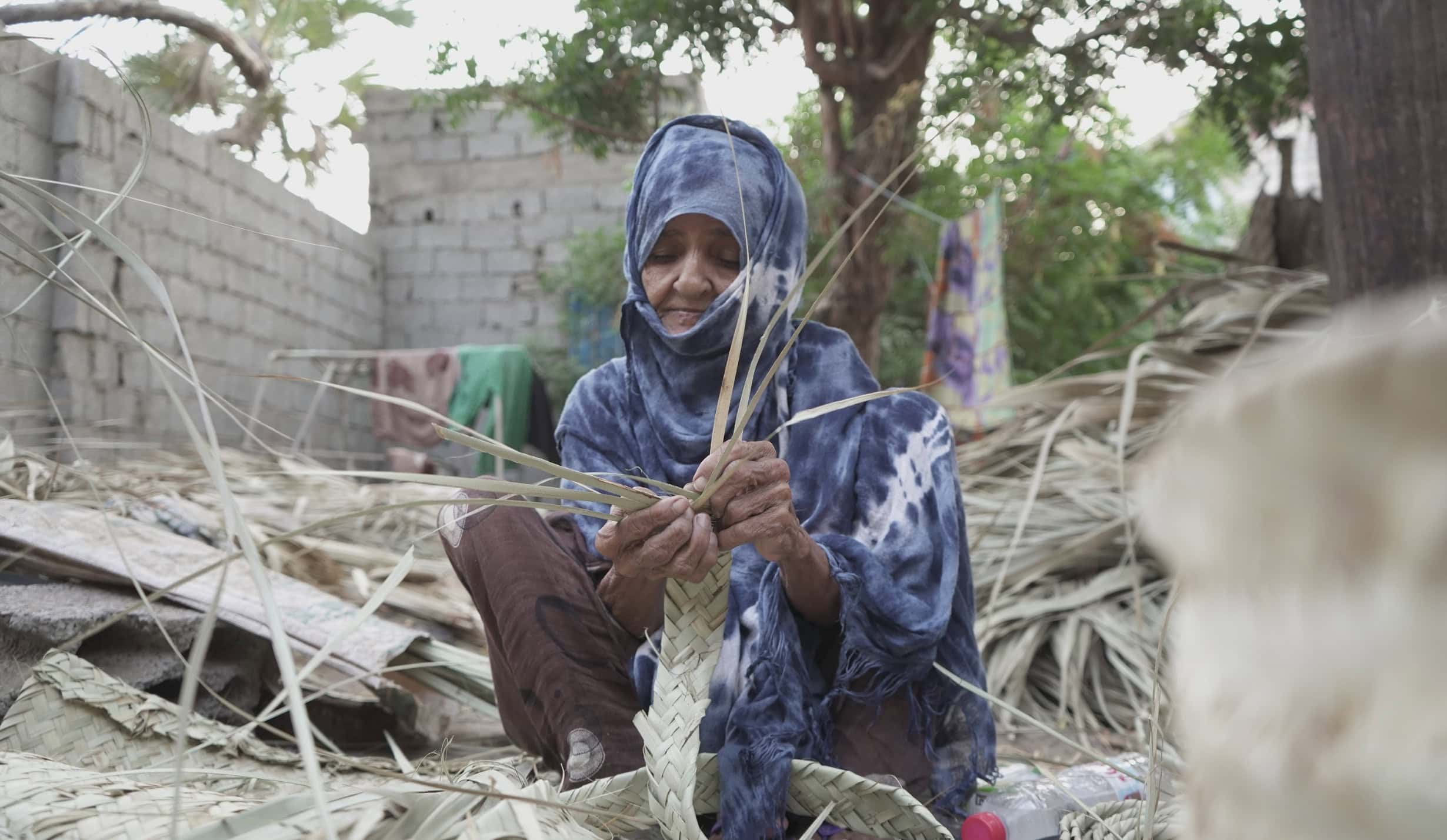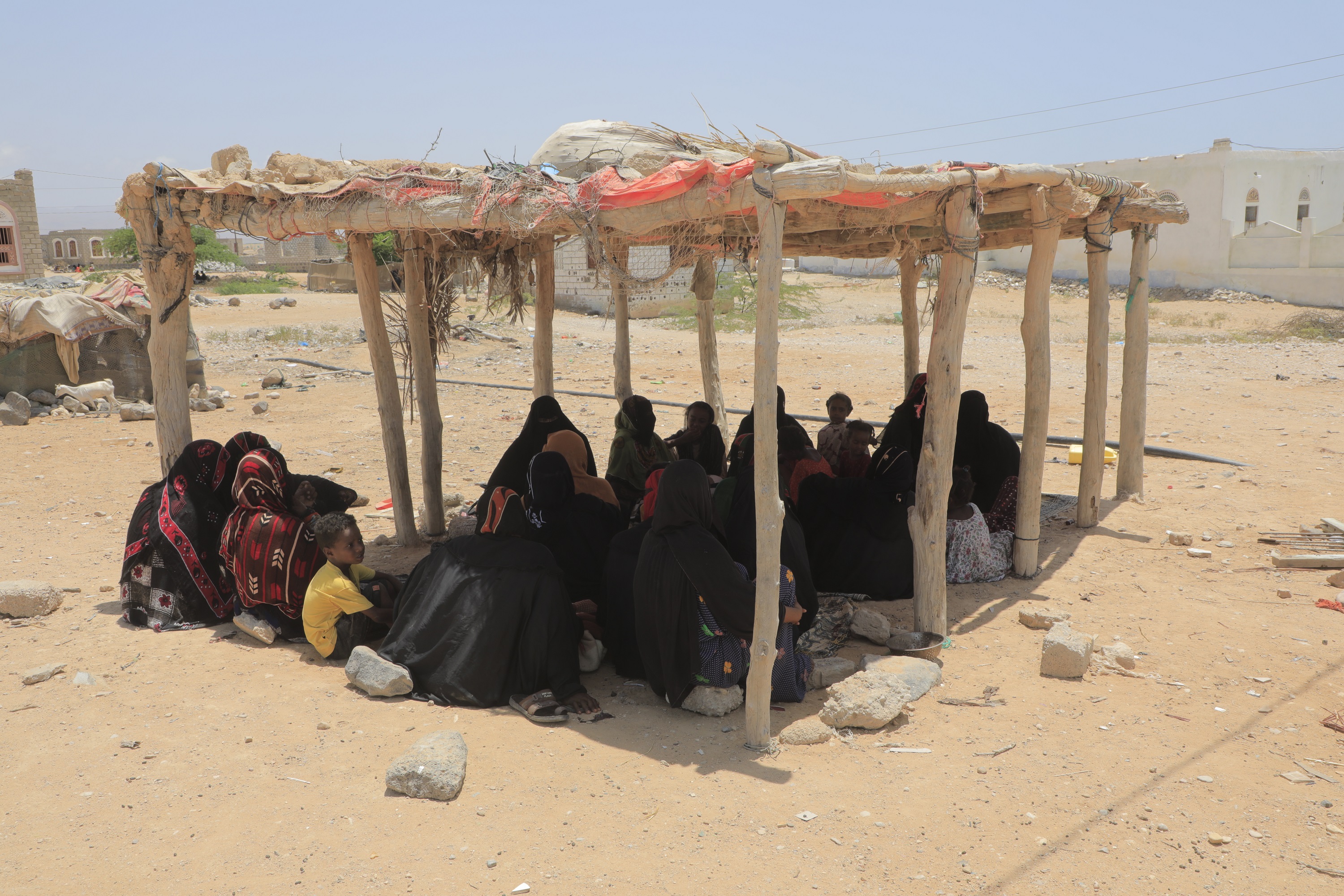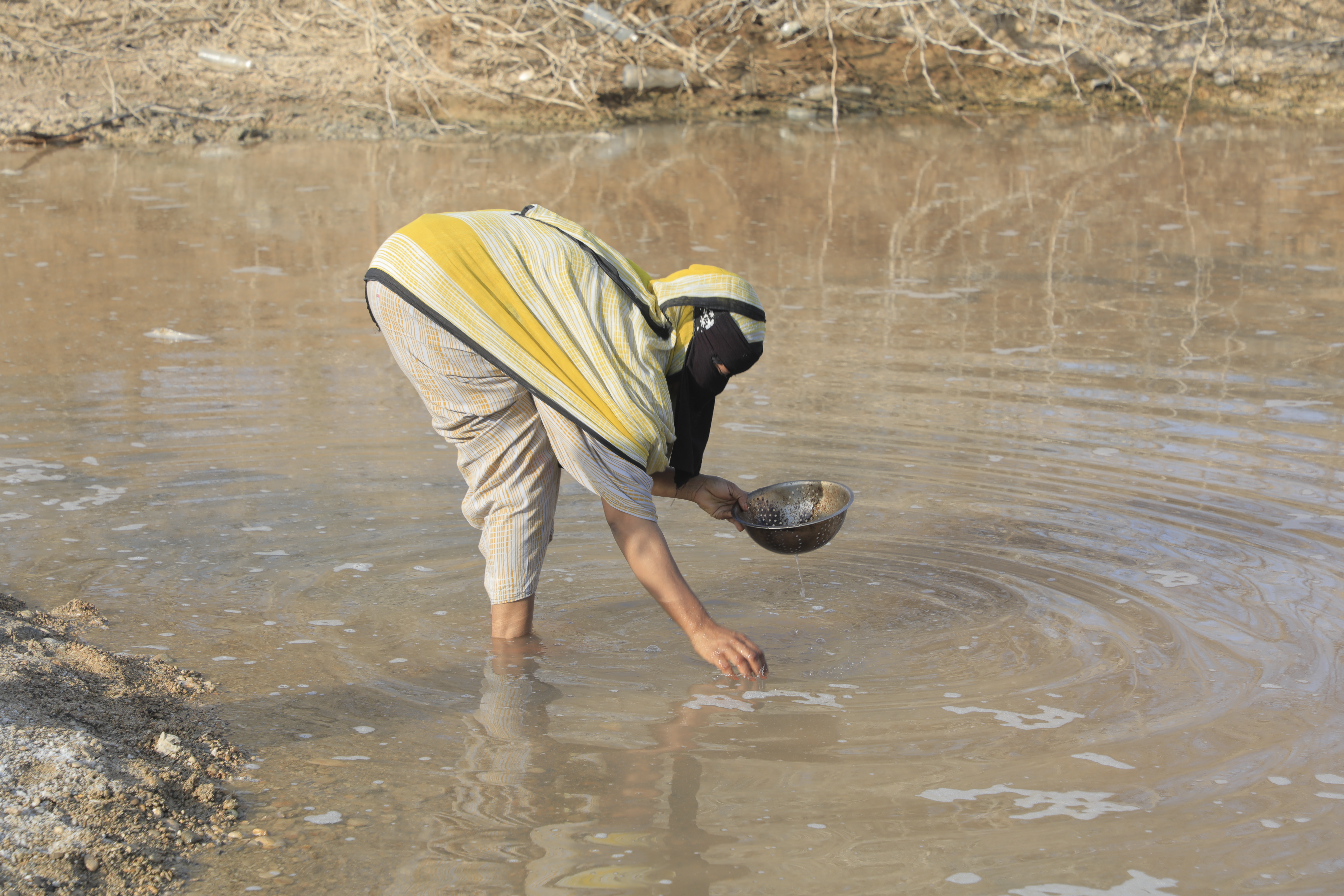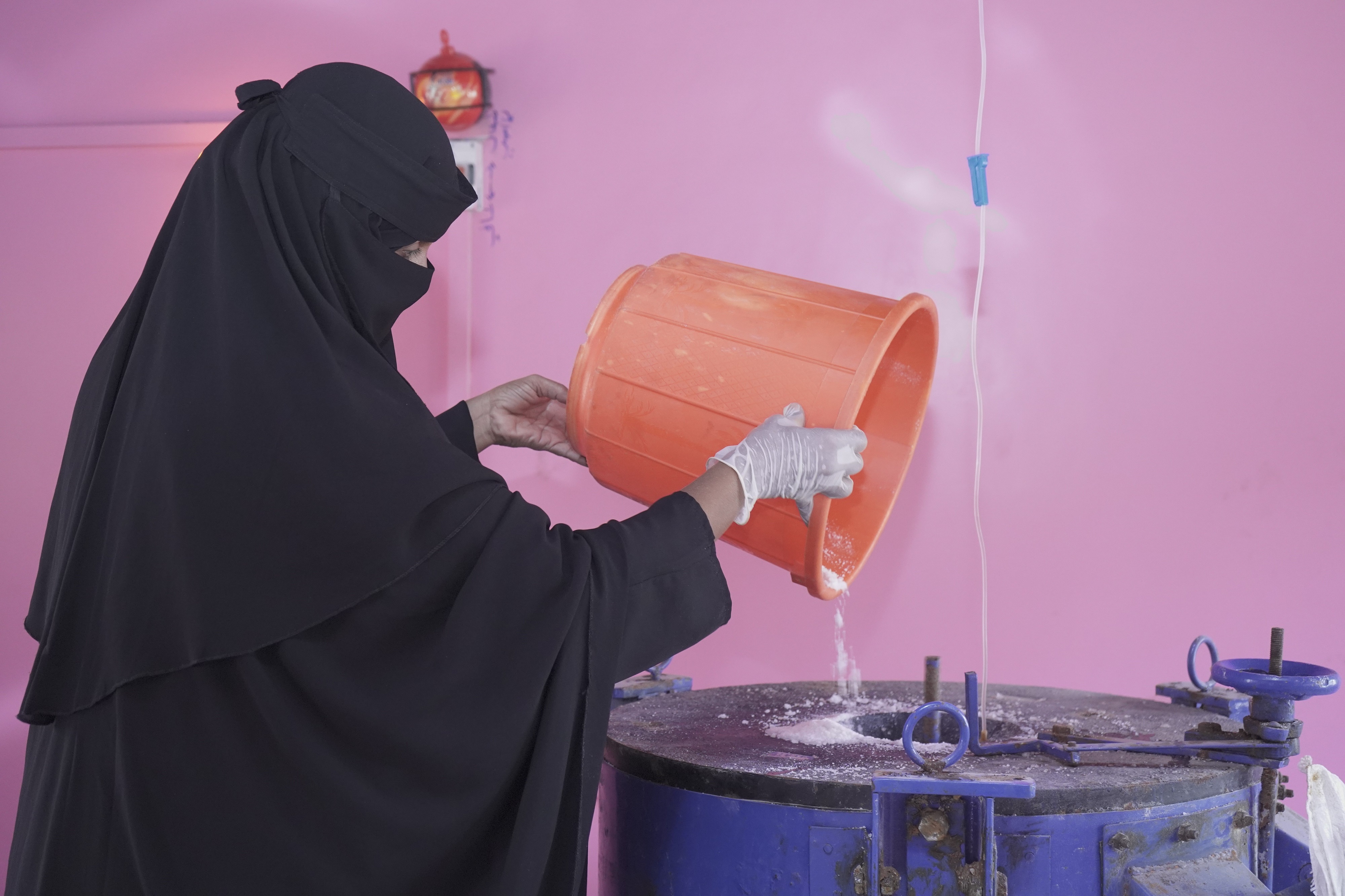
A woman weaving palm fronds to make mats and other handicraft items as part of the handmade wicker industry in Al-Haswah in Aden, August 20, 2024(South24 Center)
Last updated on: 28-09-2024 at 1 PM Aden Time

Aden (South24)
The climate change crisis in Yemen has affected the women in a big way, leading to major challenges in their daily existence, according to the findings of a policy paper (field study) brought out by ’South24 Center‘ on Thursday September 26, 2024. These include decreasing incomes, hike in food prices, damage to property, and other challenges that have been deepened by inequality as well as gender-based and social norms.
The study that was published in Arabic and is on its way to being published in English is part of a research project carried out by ’South24 Center‘ in the governorates of Aden, Hadramout, and Al-Mahra during August and September 2024, in partnership with the ’Peace Track Initiative -- founded to support the peace process in Yemen --, and funded by the ‘UK AID’ program. It includes a mixture of field visits, interviews, and surveying 120 women breadwinners in the three governorates.

A gathering of women during the field interviews conducted by ’South24 Center‘ in ’Ariout‘, Al-Masila district, Al-Mahra governorate, August 24, 2024 (South24 Center).
The paper targeted Dar Saad, Faqm, Al-Haswah areas in Aden as well as Wadi Hajar and Mukalla in Hadramout. This is in addition to the districts of Al-Masila, Sayhut, and Al-Ghayda in Al-Mahra. The main sources of income of the women are fish drying and canning, sheep herding, handicrafts, the agricultural sector, and salt extraction.

A woman harvesting salt as part of the salt extraction industry in Ariout, Al-Masila district, Al-Mahra governorate, August 24, 2024 (South24 Center)
The paper aims at:
● Analyzing the impact of climate change on women in the main income-earning affected sectors in Aden, Hadramout, and Al-Mahra.
● Exploring special challenges facing the women breadwinners in light of these circumstances.
● Providing practical recommendations to decision makers to enhance women’s ability for adaptation and resilience.
● Proposing strategies for raising awareness and supporting women affected by climate change.
Based on samples, the study research points to the negative impact of the climate change crisis on women in Yemen as shown below:
● Rising Temperatures: This has had the biggest adverse impact on the daily lives and livelihoods of women in the targeted governorates (Aden, Hadramout, and Al-Mahra).
● Rainfall Pattern Change: Over the past few decades, noticeable changes have been seen in the pattern and duration of rainfall which have become increasingly irregular. This has majorly affected the agriculture calendar, leading to irregular emergence of crops.
● Increased Storms and Floods: There has been an increase in the velocity of storms and floods, causing massive damage to infrastructure and women’s properties.
● Rising Sea Levels: This is considered a direct threat to the coastal areas in a way that impacts economic activities such as fishing and agriculture.
● Drought: Drought has affected the women farmers and cattle breeders, as women face difficulties in obtaining the water needed for irrigating crops and breeding animals.
The policy paper lists the main climate change challenges facing women in Yemen. These include decrease in incomes, which is the most common challenge. A large percentage of the women complained about the drop in family income coupled with the surge in the prices of basic commodities, which has negatively impacted purchasing power. In addition, climate disasters have caused damage to property and infrastructure. Climate change has also led to drying up of water resources, and the aggravation of health problems.
The paper shows that several women in Al-Mahra, Hadramout, and Aden rely on agriculture and fishing as a main source of food and income. However, climate change has threatened these activities in a big way. This is because floods destroy the crops while the rising sea temperature has changed the fish migration patterns. These challenges have deepened the hardships of securing enough food for families, inflicting further pressure on the breadwinner women.
The paper explains why the climate change crisis is worse for women in Yemen than for men. Due to women’s several social and economic roles, they face unique challenges that increases their vulnerability toward climate change effects. It points to the daily struggles and challenges faced by women in their attempt to adapt to a new reality imposed by climate change. The outcomes reveal the way social, economic, and cultural factors intertwine with each other to create obstacles in the path to women’s progress.
The paper also reveals a strong link between climate change and domestic violence. The vast majority of participants in the survey believe that climate change has led to an increase in the incidents of domestic violence. The paper includes first-hand experiences of the growing tensions, as many female participants have personally undergone or witnessed climate-related growing family tensions such as those caused by natural disasters or scarcity of resources.
The paper highlights the adaptation tools used by women as many of them have resorted to cutting down on domestic costs or seeking alternative sources of income. However, depending on social discussions and the support of local organizations point to the need for bigger external aid and a systematic change. The research stresses the need to confront these challenges through targeted interventions which include enhancing educational opportunities, providing economic support, and setting up comprehensive support systems for women faced with domestic violence.
Furthermore, the paper highlights the urgent need for policies that take into consideration women’s specific vulnerability in the context of climate change in a way that ensures heeding their voices and meeting their demands. It stresses on the urgent need to adopt an integrated approach to support women in adapting to climate changes. This is along with treating the social and economic challenges related to gender.

Photo: A woman working in a local fish canning factory in Faqm, Aden, August 17, 2024(South24 Center)
The paper arrived at a number of conclusions, the most prominent of which are as follows:
● Climate change has led to big challenges for women, which mainly include a decrease in incomes coupled with a hike in food prices, besides damage to property.
● Women face disproportionate burden of work, with growing domestic chores and limited access to resources.
● Climate change leads to increase in gender-based inequality.
● Women have adopted various strategies to tackle the challenges, but they are often insufficient.
● 88.2% of women said that their incomes have decreased as a result of climate change, in addition to the rising prices of basic materials, the lack of resources, and property damage due to natural disasters.
● Women stressed their concerns about food insecurity, with 85.2% of them stating that the prices have increased while 69.4% reported lack of food.
● Climate change has led to a rise in health problems. 25.5% of women complained about health problems related to change in environmental circumstances.
● Climate change has also led to rising levels of tension, triggering growing incidents of domestic violence. Over 94% of women revealed they have to contend with gender-related challenges linked to the impact of climate change.

Wadi Hajar in Hadramout, August 18, 2024 (South24 Center)
The paper has come up with some recommendations, the most prominent of which are:
● Policies and Programs: Drawing up policies suitable for men and women to adapt to climate change as well as enhancing the societal protection systems and investing in climate-smart agriculture.
● Community Initiatives: Supporting community initiatives that enable women and consolidate their adaptation abilities.
● Economic Enablement: Facilitating women’s access to credit, training, and markets to diversify their sources of income.
● Protection and Safety: Enhancing legal frameworks to protect women’s rights and providing safe shelters for those who are subject to violence.
● Urgent Support: Providing financial support and food materials to families affected by natural disasters.
● Sustainable Infrastructure Programs: Enhancing agricultural infrastructure, including irrigation systems.
● Training: Investing in training women on sustainable agricultural practices and access to healthcare services.
● Building Capabilities: Increasing the awareness programs that seek to build women’s adaptation capabilities as well as supporting social networks.
Simultaneously with this paper, ’South24 Center‘ published a video on YouTube as one of the main outputs of the project that comes ahead of the United Nations Climate Change Conference, scheduled to be held in Baku, Azerbaijan, from November 11-22, 2024. The video includes interviews with women from the three governorates, in which they speak about the impact of climate change on them such as their livelihoods and sources of income. A large proportion of these women are the breadwinners for their families.